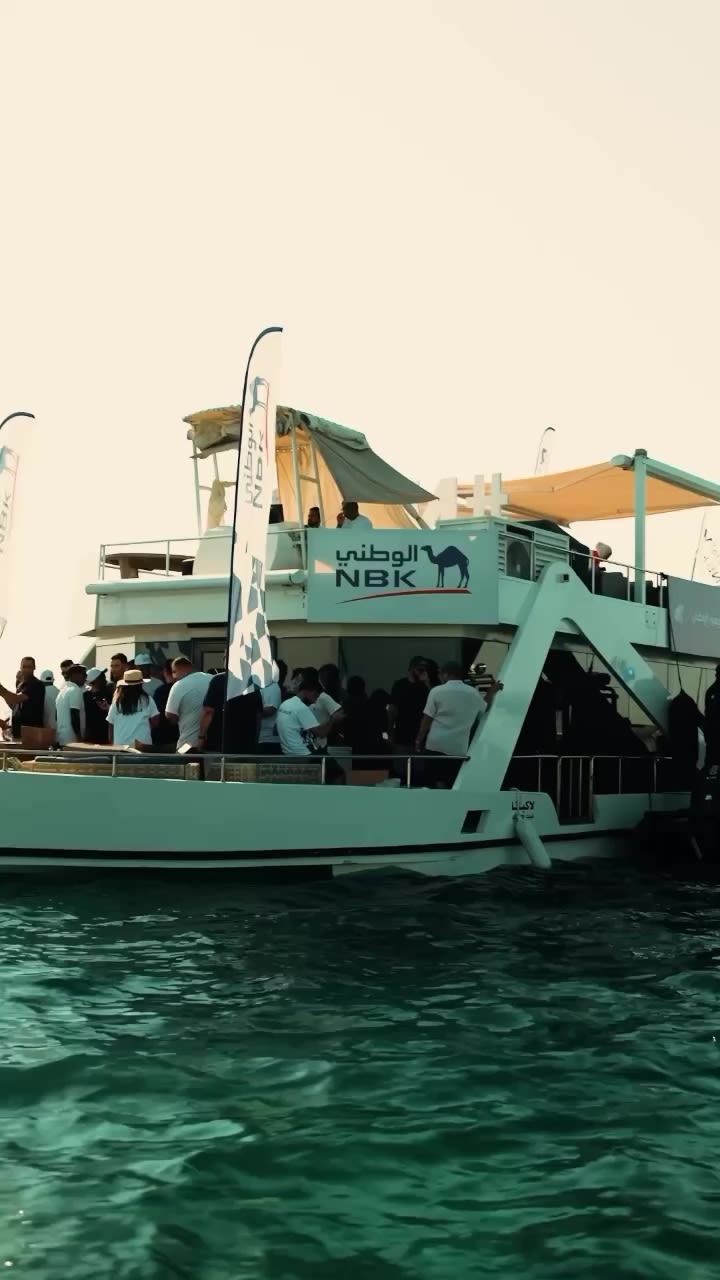Chasing profit in Paris
The story of a Kuwaiti bank stung by claims of cover-ups and risky deals

A major Middle Eastern bank trading in the heart of metropolitan Paris is embroiled in controversy for allegedly concealing critical information from the French regulator.
At the centre of the accusations is the National Bank of Kuwait in France. Nestled on the glittering Champs-Élysées, Kuwait’s largest bank by tier one capital has been catering to wealthy Kuwaitis’ forays into Parisian luxury since 1987.
But multiple people directly familiar with the bank’s inner workings claim it is led by a select group of executives who failed to report serious failures to the French watchdog.
They say that executives at the helm have pushed through allegedly risky deals despite the watchdog’s years-long investigation of the bank, as well as protests from staff responsible for vetting those deals.
This group of executives does not include any compliance staff – and the company has churned through seven chief risk officers in five years. It is now on its eighth, after the previous acting CRO quit in May.
A law firm responding on behalf of NBKF says the “misleading” and “accusatory” claims come from “a few” former staff members with employment lawsuits against the bank.
Those employees will “try to hide their misconduct or deficiencies behind alleged breaches of bank regulations…[to get] substantial damages before…courts”, law firm De Pardieu Brocas Maffei writes in an emailed memo.
Only one of the people BRR spoke to for this article has such a claim against NBKF.
Banking, Risk & Regulation travelled to Paris’ chic 8th arrondissement to speak to nine people about the bank, and reviewed more than 85 internal documents, emails, pictures and videos that supported their claims.

To inform this investigation, three French law firms provided BRR with input on the rules banks must follow.
De Pardieu says: “NBKF is under the close supervision of the [French regulator] and is regularly investigated as are all other credit institutions (especially the ones which have recently been created). NBKF takes into account the [regulator’s] recommendations … and has never been subject to any sanction since its incorporation in 2019.”
The group of executives at the heart of the dispute
NBKF is led by CEO Sabeur Sassi, styled as general manager of the bank. He arrived at the bank in 2010, fresh from a stint in Abu Dhabi working for historic Middle Eastern bank, Mashreq.
Those close to the Tunisian-born boss describe him as a “nervous” man, marked by jerky mannerisms and a leadership style seen as lacking charisma.
He is flanked by a close circle. His right hand man, legal director Jean-Guillaume Touzé, is a “frail” and “small” man who keeps abreast of the bank’s dealings with any employees who refuse to toe the official line.
The circle also includes the head of human resources, Serge Mercadal. He is in his early 60s, a jovial-looking man who is said to flush easily but whose personal conduct has also raised eyebrows.
And there is Sassi’s deputy CEO, the Barbour-jacket-wearing Florent Richard, who also leads the bank’s deals team.
Sabeur Sassi front and centre, flanked on the left by Omar Bouhadiba, CEO of NBK's international banking group, and Sheikha Al-Bahar, deputy group CEO, on the right. Positioned behind and to the right of Al-Bahar is Florent Richard. They gather on an ornate staircase for a meeting in 2024. (Image from NBK France's LinkedIn page)
Sabeur Sassi front and centre, flanked on the left by Omar Bouhadiba, CEO of NBK's international banking group, and Sheikha Al-Bahar, deputy group CEO, on the right. Positioned behind and to the right of Al-Bahar is Florent Richard. They gather on an ornate staircase for a meeting in 2024. (Image from NBK France's LinkedIn page)
Video material promoting the bank's activities. (Clips from NBK's Instagram page)
Video clips promoting the bank (Via NBK's Instagram page)
These four have one common goal: cementing the reputation of Kuwait’s largest bank in Europe.
Kuwait itself was criticised in October for “serious shortcomings” in its money laundering safeguards. International financial crime watchdog the Financial Action Taskforce called on the country to overhaul its money laundering systems and sharpen its “low understanding of its terrorist financing risk”.
Against this backdrop, the French arm of the Kuwaiti bank churns through work at its newly-decorated headquarters on the Champs-Élysées, while the risk management team sits in a WeWork next door.
But between the two offices, problems have fermented.
Entrance to the Kuwait Banks Evening Reception 2024 in Washington D.C., partly sponsored by NBK (Credit: John Everington)
Entrance to the Kuwait Banks Evening Reception 2024 in Washington D.C., partly sponsored by NBK (Credit: John Everington)
The first red flag
The first summer after the bank received its full licence, concerns were raised that executives failed to report a breach of capital rules, according to a person with detailed knowledge of the bank’s response, whose outline of the incident was corroborated by another.
One of the bank’s loans, worth close to €60mn, had breached prudential rules – which limit a bank’s exposure to any one entity to 25 per cent of its liquid capital – by more than €500,000, the first person alleged.
Failing to report an exposure breach in France can be punishable under criminal law in extreme cases, particularly if deliberate or combined with misrepresenting the bank’s accounts. In the worst case scenario, it can cost a bank its licence.
When the breach was discovered, Sassi allegedly told staff that there was no need to report the breach to the wider NBK group and that he did not want such a report to bring the regulator’s attention to the bank. BRR has checked key details consistent with this account.
NBKF denies any “unauthorised practice in relation [sic] the management of capital limits”.
“This issue is closely followed by the management of NBKF, and all breaches are duly reported and remedied with an action plan in accordance with applicable rules,” the bank’s law firm says in an emailed response to BRR.
More questionable incidents brought to light
In April this year, key information was allegedly deleted from the final draft of an annual report in which banks must inform the regulators of their most severe protocol breaches.
In a shared draft of the document, Sassi allegedly highlighted in yellow five out of the eight most “critical” breaches that staff had outlined to the regulator.
Those breaches included staff being left temporarily unable to access the French portal for reporting suspected financial crime. A second apparent breach involved a staffer being granted unauthorised access to confidential compliance files. The bank’s draft report did not specify who had authorised those two incidents.
“Do we need to declare the closed incidents?” wrote CEO Sassi in the comments on the side of the draft document, according to people who saw it.
When the report was filed with the Prudential Supervision and Resolution Authority (ACPR) in April, those five serious incidents were allegedly missing, according to people familiar with its contents.
They were absent rather than downgraded, and were not kept alongside the other, less serious, incidents, the people claim.
In a meeting that month, legal director Touzé confirmed they had been removed before the report was sent to the regulator. He claimed the “criticality” assigned to the incidents was too high and that they were removed to avoid a “disconnect” with NBKF’s systems.
NBKF denies there was any cover-up. Its lawyer tells BRR via email: “Every incident is registered in the bank’s systems so nothing is (or can) be concealed. It is however usual not to mention all incidents in detail in the report and to focus instead on incidents which have not [yet] been closed … The report is made and shared according to the legislation.”
Money laundering reports appeared to drop off
No new Suspicious Activity Reports – alerts to law enforcement of potential financial crime – were filed between October 2023 and May 2024, according to a person who oversaw the figures.
The reports appeared to flatline the month after NBKF cut back its money laundering team in September 2023, staff cuts that BRR has previously reported. The bank had typically previously filed one to two SARs a month, the person says.
The bank put in place a new protocol for money laundering alerts a few months later, in December. The new protocol allowed Sassi to look over SARs before compliance staff could file them on Tracfin, according to multiple people who saw the policy.
French legal experts tell BRR there is no rule expressly forbidding CEOs having access to SARs, and in some small banks the CEO even doubles up as the head of compliance. But it does raise regulatory concerns.
Legislation from 2014 tells banks to build a robust and independent compliance team, and to avoid conflicts of interest. This is often understood to include a strict separation of compliance roles from operational management and hierarchical independence from the units that compliance staff oversee.
NBKF’s law firm says its money laundering framework is “in line with applicable rules”, adding that French law does not prevent banks from internally controlling employees’ work. The bank’s compliance team reviews suspicious transactions daily, it says, and makes decisions “independently”.
De Pardieu states: “The number of SARs is necessarily variable and as such cannot constitute in itself an indicator of how well a compliance department is working. The SARs are indeed filed every time NBKF … suspects … criminal offence or terrorism financing.”
Staff turnover seems high
The bank paid close to €850,000 for seven negotiated departures in the financial year 2020, almost 30 per cent of the bank’s staff costs for the year, according to the ACPR.
BRR first reported concerns about NBKF’s turnover in May. A number of staff said they felt pressured to approve the bank’s deals or else be accused of “blocking business” and pushed out of their jobs. Three of the bank’s most senior risk and compliance personnel were dismissed or forced out in September 2023.
NBKF’s lawyer tells BRR that the bank “has indeed faced a turnover in its compliance team, but the department’s size is now back to normal (5 officers including a new Chief Compliance Officer)”.
A spokesperson for the bank in May strongly rejected the claims that the September 2023 departures were linked to a belief that the compliance team ‘blocks progress’.
The yacht deal that kicked off the uproar
The September round of staff cuts came on the heels of two small but crucial deals that caused quiet uproar in parts of the bank during the summer of 2023.
NBKF had lost money each year since its 2019 inception. Multiple sources say the deals team was coming under pressure to bring in profit.
One of the proposed deals, financing a billionaire’s luxury yacht in the Middle East, involved NBKF adding €25mn to a syndicated loan.
Compliance personnel at the bank were nervous. People with detailed knowledge of the conversations say they warned executives that they lacked sufficient detailed information about the chain of beneficial ownership for the company building the yacht. The company was registered in the Cayman Islands, which was then on the EU’s blacklist as a high-risk country for money laundering.
Concerns about the company’s opaque ownership structure made compliance recommend the bank withdraw, but the deal was allegedly pushed through by deputy CEO Richard, the people say.

The yacht deal wasn’t the only transaction causing friction inside the bank. A few months earlier compliance had worked on another deal, this time pre-funding oil piping in Uruguay. According to two people aware of those discussions, compliance staff were concerned that they lacked complete information about the numerous counterparties involved in the complex transaction.
Against the compliance team’s recommendation, sources close to the deal say the bank went ahead.
That year, 63 per cent of the French regulator’s “grievances” against the wider financial sector stemmed from failures in this area of compliance: know-your-customer checks. The ACPR issued fines worth millions of euros over the failures.
Under the French Monetary and Financial Code, as well as under EU regulations, banks are told to avoid business relationships if they cannot fully verify beneficial owners, and should generally not approve deals against compliance’s recommendation.
Executives can still greenlight a relationship in order to meet business objectives if the risk is low, but should prioritise protecting the bank’s delicate internal controls over short-term financial gains.
Overriding compliance risks reputational damage, particularly if the customer is later linked to financial crime. In the worst cases, the regulator can hand down punishments, including dismissing executives and withdrawing the bank’s licence.
NBKF denies any wrongdoing, noting that other large international banks participated in both deals, which it says were made public.
The response from its lawyer adds: “Management took its decision to move [forward with both deals] after compliance issued its opinion and all the additional required documentation was obtained.”
France's banking regulator is on the prowl
In 2020, a year after NBK established its French arm, the financial watchdog began an investigation, sending the bank a lengthy report detailing 27 deficiencies a year later, according to multiple people who saw the report.
It is unclear whether the bank’s alleged prudential breach in August 2019 sparked the investigation.
The ACPR, part of France’s central bank, warned NBKF that its risk management was “weakened and insufficiently effective”, in part because of multiple vacancies and the “resulting pressure” placed on too few employees.
The bank’s resources allocated to credit risk monitoring were deemed “insufficient”. NBKF was issuing loans with insufficient checks, the ACPR said, and its risk department created reports missing too much information.
The bank’s sanctions framework was also criticised in a sanctions-specific follow-up to the report, for failing to regularly screen some third parties.
Sassi assured the ACPR’s inspector in the summer of 2021 that NBKF would hire more personnel, fix its problems, and treat the regulator’s recommendations with the “utmost seriousness”.
But BRR’s investigation shows multiple people in the bank’s risk and compliance teams responsible for vetting deals for money laundering still complained of chronic understaffing and high pressure between September 2023 and January this year.
“The problem is the amount of work… I couldn’t [perform all the background checks I needed to], it’s impossible,” one insider says. Another person complained repeatedly that they were handed deals to review on deadlines they found difficult to meet.
One person says they gained 20 kilograms in weight from stress at one point, while another turned to regular medication to cope with the “pressure”. A third took extended sick leave for four months, seeking respite from the stress.
NBKF says it “takes into account” the regulator’s recommendations and reiterates that the bank has never been “sanctioned”.
“NBKF is attentive to the health of its employees and strives to provide each of them with a safe working environment and a reasonable workload even though, as in other banks, the employees can punctually [sic] face challenging deadlines,” the bank’s lawyer states.
Some employees felt they had nowhere to turn. In 2023, a former senior member of the bank’s risk management attempted to confidentially report their concerns to the board of directors via direct emails to deputy group CEO Shaikha Al-Bahar and the Kuwaiti CEO Salah Al-Fulaij.
Reporting concerns directly to the board and bypassing executives is protected by French law, to guarantee the head of risk’s independence from potentially rogue executives.But the employee’s emailwas allegedly re-routed to Touzé, without their agreement, and appears not to have been acted on.
NBKF’s lawyer says its “control functions” do have access to the board of directors, “but that does [not] mean that the directors have to meet them if they do not believe it is necessary”.
Sex Olympics games and soft porn
Insiders claim they cannot turn to HR for help either because NBKF’s head of HR, Mercadal, is himself the subject of allegations of sexual impropriety.
“He comments on [women’s] clothes, he makes sexual jokes which are not funny, he is disgusting,” says one insider.
WhatsApp images seen by BRR show Mercadal regularly sharing memes and misogynistic soft porn videos with staff – one titled “the sex Olympic Games” – that show explicit images of women, memes of nuns making sexual jokes about bananas, and animals’ genitalia.
BRR chose not to reproduce the most explicit videos and images
Text: "That might be a bit too much, right?"
"It doesn't matter, the extra ones, we'll eat them."
Warning: content may cause offence.
Press play to see a clip of the video.
“On a Saturday at 10[am], you receive, like on WhatsApp, a picture of a girl who is naked,” says one person who received the images.
Despite evidence of the alleged impropriety sent to Touzé, who took over the bank’s whistleblowing channel in September 2023, no action seemed to have been taken.
NBKF would not comment on individual cases, but says in a memo from its lawyer that it “takes into account the reports made by its employees and conducts investigations if necessary”.
Mercadal, Touzé, Sassi and Richard did not respond to emails offering them the opportunity to respond individually.
The allegations against NBKF paint a picture of staff trapped in a cycle of cultural and compliance issues.
Morale seems low. In one senior insider’s words: “You can’t talk to group HR, you can’t talk to anybody, because you know that at the end it will come back to [Sassi], and then you could get in trouble.”
Fin.
Photos via Unsplash with Aleksiii, Rodrigo Kugnharski and Lidija Jakovljevic; video via Envato Elements with Sleg211




